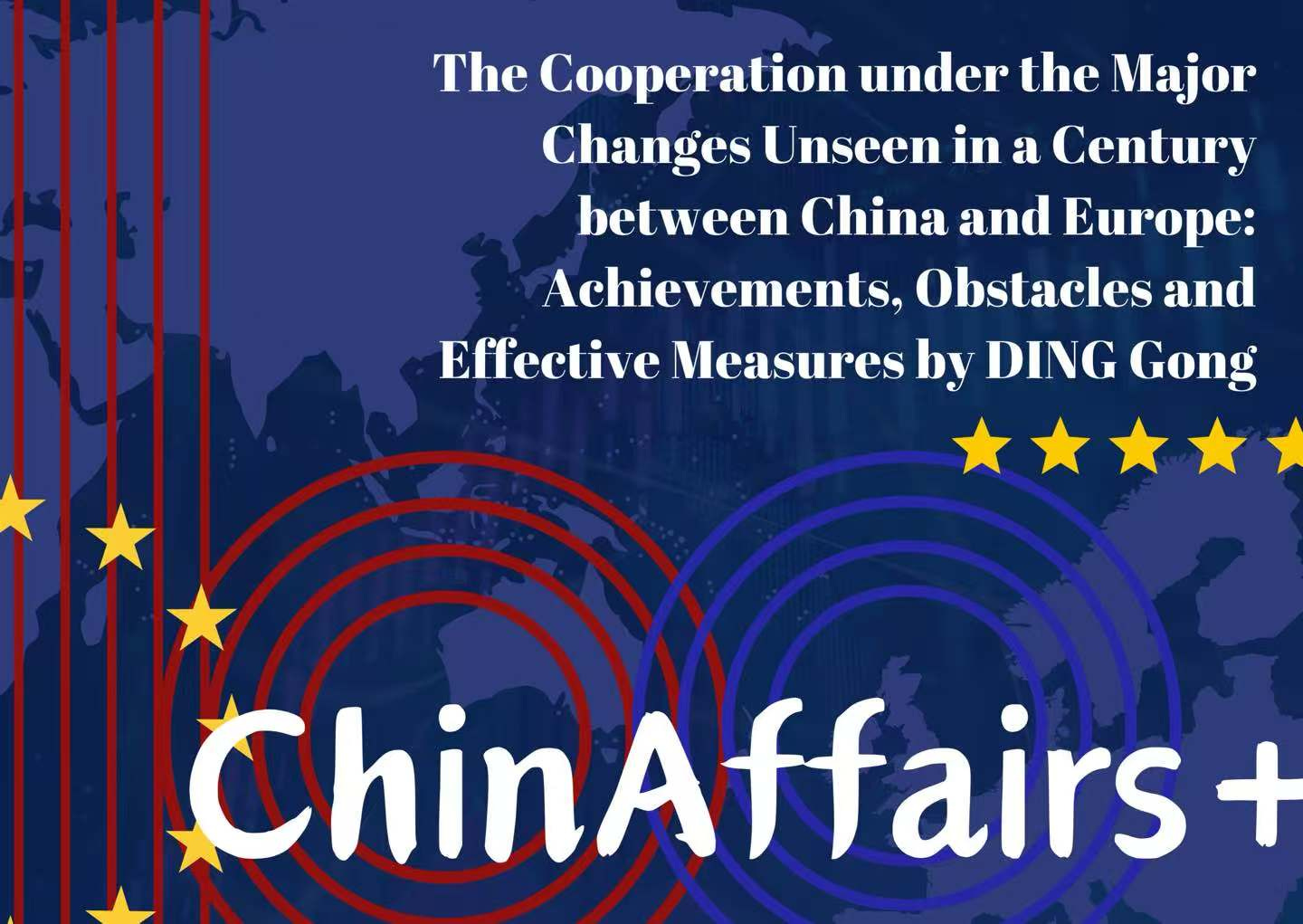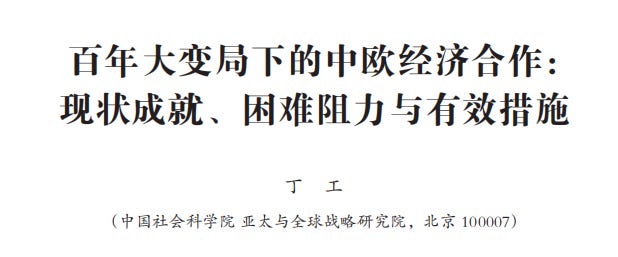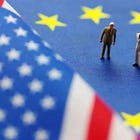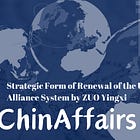The Cooperation between China and Europe under the Major Changes Unseen in a Century by DING Gong
Cooperation between China and the EU matters a lot in this era.
Welcome to the 17th edition of our weekly newsletter! ChinAffairs+ is a weekly newsletter that shares Chinese academic articles focused on topics such as China’s foreign policy, China-U.S. relations, China-European relations, and more. This newsletter was co-founded by me and my research assistant, ZHANG Xueyu. I am SUN Chenghao, a fellow with the Center for International Security and Strategy (CISS) at Tsinghua University, Council Member of The Chinese Association of American Studies and a visiting scholar at the Paul Tsai China Center of Yale Law School (fall semester 2024).
Through carefully selected Chinese academic articles, we aim to provide you with key insights into the issues that China’s academic and strategic communities are focused on. We will highlight why each article matters and the most important takeaways. Questions or criticisms may be addressed to sunchenghao@tsinghua.edu.cn
Today, we have selected an article written by Ding Gong, which focuses on the cooperation under the major changes unseen in a century between China and Europe: achievements, obstacles and effective measures.

Summary
As the two major forces, markets, and civilizations in the world today, China and Europe hold a pivotal position in global politics and economic activities. Currently, the world is undergoing profound changes unseen in a century, with profound changes and adjustments to the international order and global system. The European Union is also committed to advancing to a higher position and achieving greater aspirations on the international political stage. At the same time, China is currently in a period of great historical opportunities and facing external environment changes and uncertainties brought about by the major changes unseen in a century. Therefore, promoting cooperation between China and Europe to a higher level not only ensures their respective development needs and international status, but also conforms to the overall goals and long-term interests of both sides' planning and design, and has significant strategic significance and global impact on each other. Especially, with the upgrading of domestic consumption and the transformation of economic industries, the service industry has become one of the important driving forces for China's economic development. China has begun to increase the import of goods and services on a larger scale, injecting stronger momentum and vitality into China and EU economic cooperation.
Why It Matters
This article is thought provoking since it analyzes the current state, achievements, challenges, and countermeasures of China-Europe economic cooperation against the backdrop of the changes unseen in a century. First, it highlights the critical role of China and Europe as two major markets and powers in international political and economic activities, providing clear strategic directions to address the profound transformation of the global order. Second, the article emphasizes that China-Europe economic cooperation not only meets their respective development needs but also contributes to global governance and multilateral collaboration, injecting positive momentum into world peace and prosperity. Furthermore, by identifying opportunities in multilateralism, industrial chain coordination, and technological innovation, the article proposes actionable recommendations that offer valuable insights for policymakers. These insights not only help mitigate differences and deepen mutual benefits between China and Europe but also provide key strategies for promoting a more equitable and reasonable international order.
Key points
The world today is undergoing profound changes unseen in a century, marked by persistent regional turbulence, a resurgence of strategic competition, and the rampant spread of terrorism. At this critical juncture, as two major powers, markets, and civilizations in the world, China and the EU hold pivotal positions in global politics and economic activities. What China and the EU advocate for, oppose, and cooperate on carries global significance, not only affecting their respective futures and development trajectories but also directly shaping and determining the evolution and direction of the international system.
The Achievements and Driving Forces of China-Europe Economic Cooperation
China-Europe cooperation is characterized by the interplay of bilateral and multilateral dimensions, the coexistence of comprehensive issues, and functional governance, carrying significant strategic importance for regional and global peace and development.
Global Health Cooperation after the Outbreak of COVID-19: China and the EU have maintained close communication on coordinated pandemic response and global health cooperation, demonstrating the contemporary significance and global influence of the China-EU Comprehensive Strategic Partnership. This has also greatly strengthened their sense of cooperation and partnership.
The Pursuit of Independence and Strategic Autonomy: Both China and Europe strive to become an independent pole in a multipolar world, which can ensure the fulfillment of their respective development needs and international status, and aligns with both sides' strategic objectives and long-term interests. For the EU, it has always longed to return to the glorious peak of its history, striving to ensure that it can play a unique role in the multipolar world. For China, From being a "follower" striving to integrate into the Western international system in the early stages of reform and opening up, it has now transformed into a "leader" on major international issues in the emerging multipolar order. China and Europe do not have geopolitical conflicts and share similar views on reshaping international order, which can be essential for their further cooperation.
Potential China-EU Economic Cooperation: China has a vast and highly potential market, with the ability to offer higher-end development opportunities for EU countries. So China and Europe share common interests in promoting economic and trade cooperation. Both sides should fully leverage their advantages and highlight their unique features, generating a multiplicative effect and exponential benefits through complementary cooperation rather than simple addition.
The Obstacles and Challenges Facing China-EU Economic Cooperation
China and the EU could have been great partners, mutually enlightening and achieving success together, rather than becoming "imaginary enemies" who consume and guard against each other. However, certain difficulties and obstacles have hindered the further advancement of China-Europe relations.
The U.S. as a Disturbative Variable: In current international relations, the United States is almost an essential factor that every country must consider in their foreign relations. Both China and Europe devote a significant amount of attention to managing their relations with the United States. The European Union does not want to see tensions between the United States and China escalate, nor does it want great power competition to exceed limits, potentially triggering strategic rivalry or disrupting multilateral or regional orders and trade systems. But there is often a situation where the United States takes the lead in confronting China, with the European Union quickly following suit. The influence of the United States continues to cause the European Union to oscillate between autonomy and dependency.
The Changes of China and EU Economic Structure: The economic and trade structure between China and Europe is showing an increasingly serious trend of weakening complementarity and strengthening competition. As China's economic competitiveness and industrial structure upgrade, the technological content and added value of Chinese products continue to rise. Besides, China's ability to attract foreign investment is continuously expanding, and Western industries are likely to shift on a large scale to China. Therefore, some Western countries regard China as a threat for their economic development, starting to resort to strategies of "de-Chinaization" in their industrial chains and supply chains.
Strengthening China-EU Economic Cooperation under the Context of Changes Unseen in a Century
As the global, strategic, and worldwide impact of China-Europe relations becomes increasingly prominent, both sides should strive to establish a new type of great power relationship characterized by coexistence of competition and cooperation, promoting their relationship to new heights.
Promoting Multilateralism and Countering Global Tensions: China-EU cooperation is grounded in their shared support for multilateralism and opposition to unilateralism and protectionism. Both sides depend on and benefit from globalization. In contrast, the isolationism and unilateralism promoted by the Trump administration have exacerbated regional conflicts. To counter these challenges, China and the EU must stand united in their commitment to multilateralism, fostering global cooperation and stability.
Cooperation with the Middle Powers: It is important to explore the unique value of middle powers within the European Union and focus on strengthening cooperation with these countries. The disparity in strength and status determines that middle powers and great powers compete on different scales, making the likelihood of "zero-sum competition" much lower than the possibility of a "win-win" outcome. Therefore, in promoting China-Europe cooperation, it is essential to explore the unique value of middle powers within the EU and focus on strengthening cooperation with them. This approach would help reduce the cost-benefit ratio of China-Europe cooperation, making it more efficient and mutually beneficial.
Engaging in "Third-party Market" Cooperation: This kind of cooperation will be beneficial to achieve a win-win situation for China, Europe, and the host or partnering countries, ensuring mutual benefits for all parties involved. "Third-party market" cooperation can combine China's strengths in production capacity, equipment, and engineering construction with Europe's advantages in core technology, equipment, and market management experience. At the same time, it can align with the industrialization and modernization needs of developing countries, promoting trade and economic cooperation beyond the bilateral level. This will ultimately help establish a mutually beneficial, multi-party development partnership. China and the EU each have distinct advantages and development needs, occupying different positions in the same industrial chain, which creates significant potential for cooperation in third-party markets.
Accelerating "Two-way Engagement" in People-to-people Exchanges: As two major civilizations and strategic powers in the world, both China and Europe have long and illustrious ancient histories and vibrant, diverse cultures. They are both "superpowers" in the fields of cultural arts and natural landscapes. This shared heritage gives China and Europe distinct and complementary tourism resources, with strong uniqueness and limited substitutability. As a result, both sides hold a comparative advantage in tourism market development, with ample motivation and potential for growth.
Conclusion
The post-pandemic reshaping of the international order requires countries to reposition themselves, intensifying competition over international rules. China and Europe, as large-scale markets with strong domestic demand, should focus on mutually beneficial strategies, developing solutions to support each other’s growth and contribute to global governance and economic recovery.
China, in its transition to a stronger power, needs a stable international environment, while the EU, seeking a larger role in global affairs, also requires China’s support. Together, as key political powers, they must prioritize dialogue, cooperation, and win-win outcomes.
By deepening trade and industrial cooperation, both sides can create new growth points, accelerate trade, and strengthen bilateral ties. This will lay a strong foundation for higher-level cooperation, enabling China and the EU to tackle global challenges, promote mutual development, and contribute to the global economic recovery, while enhancing their roles in international affairs.
About the Author
Ding Gong (丁工) is a fellow of National Institute of International Strategy Chinese Academy of Social Sciences (NIIS CASS) who received his Doctor degree in law from the Party School of the Central Committee of C.P.C and is a postdoctoral fellow at the National Institute of International Strategy at the Chinese Academy of Social Sciences.
About the publication
Northeast Asia Economic Research(《东北亚经济研究》) is an academic journal sponsored by the Jilin Provincial Economic Management Executive Institute and the Institute of International Trade and Economic Cooperation of the Ministry of Commerce, which mainly publishes original research papers, reviews and comments the field of Northeast Asia economic cooperation to promote the implementation of the Changjitu development and opening-up pilot zone strategy, expand academic communication and serve society and economy.










